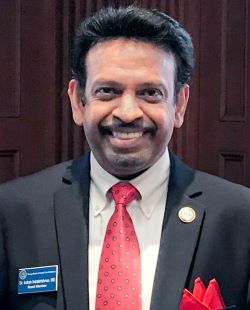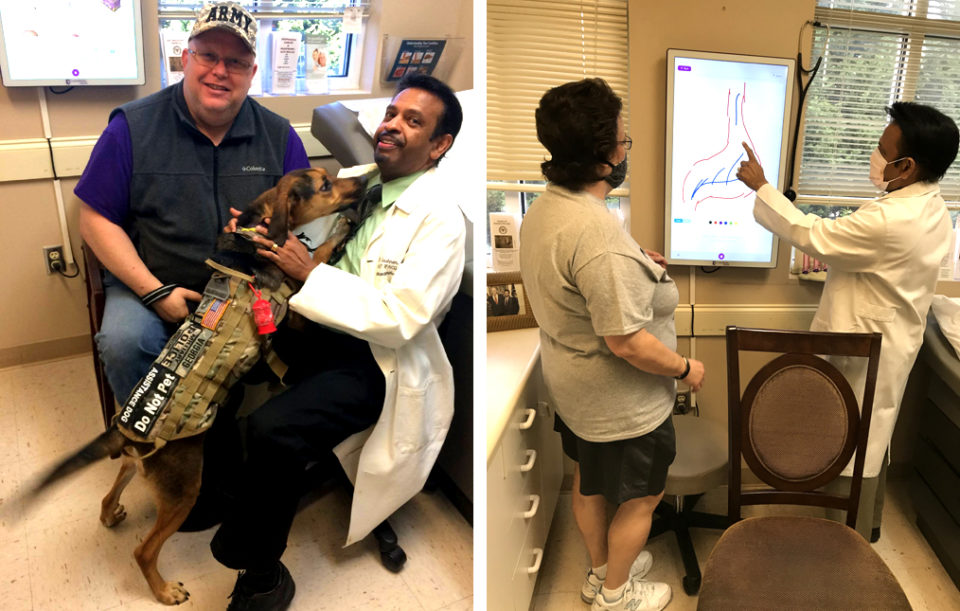This is the fourth of a five-part series where noted Atlanta gastroenterologist and Emory School of Medicine professor, INDRAN INDRAKRISHNAN, MD* answers questions related to COVID-19.
Cover photos: Dr. Indrakrishnan in his office with his patients in the pre-Covid and Covid eras.
Is telemedicine the future of healthcare?
The Covid-19 has dramatically changed the way physicians practice medicine in this country. I have always talked to my patients on the phone, but I’ve never done a formal telemedicine consultation in lieu of an office visit in my 25 years of practice. Now, I have done a few dozen of them in just the past two months of the pandemic.
Telemedicine will continue to play an important role in patients and physicians’ interactions in the future. In July of last year, Governor Brian Kemp signed the Georgia Telemedicine act (SB 118) legislation – well before the appearance of Covid-19. This bill has already revamped the very old rules and regulations of Telemedicine and given it a good facelift. Medical College of Georgia has introduced Telemedicine as a part of the curriculum for its students starting from this year.
Telemedicine is convenient and saves patients time in traveling and waiting in the reception room. It is cost-efficient and gets the results of investigations transmitted in an expedited manner. However, there is always a risk of inadequate assessment leading to wrong diagnoses when patients are not seen and examined in person. In addition, electronic glitches can frustrate patients and physicians in the middle of a consultation. Technology is always good when it works!
Tele Medicine can be a boon for rural patients where there is shortage of physicians, particularity specialists. These patients endure long commutes and delayed appointments for life saving consultations and chronic care plans. Accessing both primary care physicians and specialists is difficult in many rural areas and I witness this frequently as a member of the Georgia Board of Healthcare WorkForce which looks after Georgia Rural Health.
Healthcare regulations, reimbursements policies and privacy protection struggles are some of the hiccups we need to overcome in the upcoming years for Telemedicine to become more desirable for patients and physicians.
Do physicians/frontline workers in Georgia have enough PPEs available
Yes, currently we do have enough PPEs in Georgia. But this was not the case at the beginning of pandemic as the demand for PPEs unprecedentedly rose by several hundred folds within few days as infections began to spread exponentially. Everyone was taken by surprise and some started pointing fingers at whoever they could blame for the shortage not appreciating the magnitude and the nature of the disaster. However, with the increased production and importing from other countries, this ” shortage” was brought under control and now we do have enough PPEs. Even earlier, the shortage was largely due to the mismanagement of distribution of PPEs to institutions. Some obtained and reserved more than what they needed, expecting the unexpected and others were at the brink of not having enough supplies for the following week. Now I wonder whether there is even an oversupply of PPEs as I do receive dozens of solicitations offering discounted PPEs at wholesale. We see PPEs sales on social media, with very attractive models!
There is always an uneasy feeling about another Covid-19 wave in the fall and we should be prepared well, by learning from the errors in the production and distribution of PPEs. There was so much hype and chaos about inadequate ventilators nationally and in Georgia. However, I do not recall a single incident at least in Georgia where a patient died because of lack of access to a ventilator or due to premature removal from a ventilator. Having said that, now we see a sharp upward trend in the Covid related hospitalization rates in some states, particularly in Florida and Texas. I have observed a similar trend in Georgia in the past week, although it is not as bad as some other states. We must be prepared with all the precautionary measures in terms of PPEs.
How do you as a physician protect yourself from the virus? Do you feel safe going to work?
Physicians’ exposure risk to Covid-19 depends on their specialty – precisely how closely they are with the patients during examination and surgery. We routinely screen patients for potential covid19 infection and if there is any suspicion, they are tested before the procedures. As a Gastroenterologist, my risk for exposure is less compared to an anesthesiologist or intensive care specialist. The exposure is critical during endoscopy procedures. It is not just me– my entire team of receptionists, medical assistants, surgical assistants, registered nurses and the anesthesia providers are also at risk. All of us wear disposable PPEs during procedures and wash hands. As such, all what we do now is to double down this practice and implement very strict infection control measures at our Endoscopy center. We follow the guidelines provided by CMS and the American College of Gastroenterology.
I wear mask when I see patients in the office, and this is new to me! And we maintain a physical distance unlike the cozy atmosphere in the pre-covid era. We request patients to wear masks and if they do not have one, we provide it to them free of charge. Washing hands is a routine practice after each patient encounter but now we make it a point to increase the frequency of handwashing in between the patients’ care. Patients are spaced out in appointment times and in the seating in the reception area. Patients are not admitted into the office building if we find them to have a high probability of Covid-19 infection on screening questions. We provide Telemedicine for them immediately and request them to undergo Covid-9 testing and come back for direct examination if the test is negative. The entire office and the Endoscopy center are cleaned frequently by the staff and then a meticulous terminal cleaning is done daily by the professional cleaning company at the end of the day. Our office and the endoscopy center implement very strict and extreme infection control measures which tremendously help us to maintain an infection-free environment. With the above, I do feel safe going to work but still I worry about bringing the infection home from the workplace silently to the family members.
Q&A with Dr. Indrakrishnan will continue…

*Dr. Indran Indrakrishnan is a well-known Atlanta based gastroenterologist and clinical professor at the Emory University School of Medicine. In 2018, Dr Indrakrishnan became the first American of Indian descent to receive a commendation from former Georgia Governor Nathan Deal for his exceptional work in improving the lives of Georgians affected by colorectal cancer and other gastroenterological diseases.
The Georgia Senate passed a resolution in 2017 honoring Dr. Indrakrishnan’s service to Georgia. The Georgia House of Representatives followed suit with a resolution declaring February 14th 2018 as Dr Indrakrishnan day.
He was also named among the 25 Most Influential Asian Americans in Georgia twice- in 2016 & 2018.
Dr. Indrakrishnan is a former president and board member of the Georgia Gastroenterology and Endoscopic Society and currently sits on the Georgia Board of Healthcare Force, as well as the boards for Rainbow Village, Fight Colorectal Cancer, Meals by Grace and Hindu Temple of Atlanta. He is also past president of Georgia Association of Physicians of Indian Heritage (GAPI) and currently on the board of trustees.





